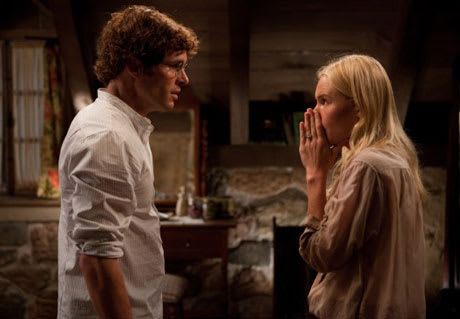These days, remakes are made for many avaricious reasons. Some are made to revamp a dead franchise. Others are made simply to make an easy profit. Then there are those that are redone merely to reassure and placate chauvinistic desires in sexist male moviegoers. Straw Dogs is clearly made for the latter reason.
Although not a shot for shot remake like Gus Van Sant's appalling Psycho, director Rod Lurie's remake of Sam Peckinpah's controversial Straw Dogs features the exact same premise, characters and inevitable bloody outcome, yet is shot for a more commercial crowd, making it a far more glorified and senseless version than its predecessor.
Taking place in the deep South, instead of England, David, (James Marsden), a pompous L.A screenwriter, and actress wife Amy (Kate Bosworth) move to her hometown in Mississippi so he can finish his script about Stalingrad while construction workers work on re-building the roof of her family home. (Does this make any sense at all?)
When David recruits Amy's former flame, Charlie (Alexander Skarsgård), and his redneck friends to work on the roof, tensions build as each man is determined to exert their overblown superiority complexes on one another, which leads to a gruesome home invasion and a battle of brawn over wits between the couple and the locals. Another needless grindhouse redux ensues.
Lurie's take on Straw Dogs is just as slow-paced and infuriating as the original. Every character is equally unlikable, despite the fact a few of their personality traits have changed. David, the film's cowardly protagonist, doesn't yell or slap his wife around like in the original, rather he mocks her lack of intelligence by teaching her how to play chess by sticking chess pieces inside her and making her guess what pieces they are. (The way every woman should play the game, right?)
Amy, this time round, has a little back bone to her, although she does gets brutally sexually assaulted the exact same as in the original. However, Lurie makes sure viewers know she isn't enjoying it (unlike Peckinpah's ambiguous rape scene in the original) and because she inexplicably shows her breasts to the redneck workers in an earlier scene it's not as bad to watch because, after all, she was "asking for it."
The implicit sexism and mixed "feminist" messages make this film fairly difficult to sit through and the fact that it leads to a glorified home invasion siege full of CGI kills and thrills in the very rushed last act makes it even that much more frustrating to watch.
It's clear that Lurie's intention for the remake was to show how men are conditioned for violence when put into a life and death situation, rather than suggesting all men can't escape their innate violent tendencies like Peckinpah did.
Sadly, those differences go highly unnoticed in this over ambitious thriller.
(Sony)Although not a shot for shot remake like Gus Van Sant's appalling Psycho, director Rod Lurie's remake of Sam Peckinpah's controversial Straw Dogs features the exact same premise, characters and inevitable bloody outcome, yet is shot for a more commercial crowd, making it a far more glorified and senseless version than its predecessor.
Taking place in the deep South, instead of England, David, (James Marsden), a pompous L.A screenwriter, and actress wife Amy (Kate Bosworth) move to her hometown in Mississippi so he can finish his script about Stalingrad while construction workers work on re-building the roof of her family home. (Does this make any sense at all?)
When David recruits Amy's former flame, Charlie (Alexander Skarsgård), and his redneck friends to work on the roof, tensions build as each man is determined to exert their overblown superiority complexes on one another, which leads to a gruesome home invasion and a battle of brawn over wits between the couple and the locals. Another needless grindhouse redux ensues.
Lurie's take on Straw Dogs is just as slow-paced and infuriating as the original. Every character is equally unlikable, despite the fact a few of their personality traits have changed. David, the film's cowardly protagonist, doesn't yell or slap his wife around like in the original, rather he mocks her lack of intelligence by teaching her how to play chess by sticking chess pieces inside her and making her guess what pieces they are. (The way every woman should play the game, right?)
Amy, this time round, has a little back bone to her, although she does gets brutally sexually assaulted the exact same as in the original. However, Lurie makes sure viewers know she isn't enjoying it (unlike Peckinpah's ambiguous rape scene in the original) and because she inexplicably shows her breasts to the redneck workers in an earlier scene it's not as bad to watch because, after all, she was "asking for it."
The implicit sexism and mixed "feminist" messages make this film fairly difficult to sit through and the fact that it leads to a glorified home invasion siege full of CGI kills and thrills in the very rushed last act makes it even that much more frustrating to watch.
It's clear that Lurie's intention for the remake was to show how men are conditioned for violence when put into a life and death situation, rather than suggesting all men can't escape their innate violent tendencies like Peckinpah did.
Sadly, those differences go highly unnoticed in this over ambitious thriller.
